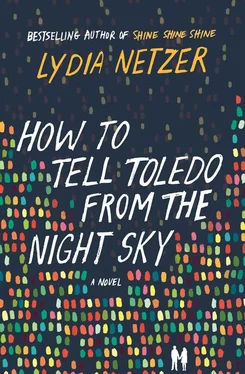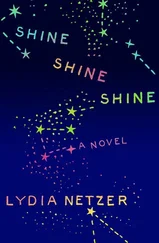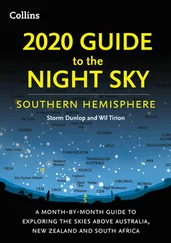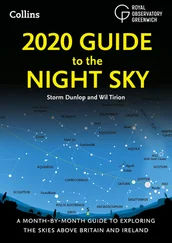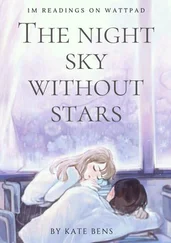This is it, she thought. This is me. I am here. I have not failed. I have done the opposite.
Alone in the cool silence of the Fiat, on the treelined avenue, she could be triumphant. It was finally all happening, and she forced herself to enjoy it. Many beautiful things were gone in an instant. A feeling, a memory, a black hole brightly glowing in a jar.
Irene parked the Fiat and got out into the September heat. She walked across the sunny parking lot, breathing in that hot Ohio air. Her heart had yet to establish its own steady rhythm. It still beat and skipped and raced to find her mother’s heart beating. Walking up the sidewalk, she clutched her laptop bag to her chest. She read the names of the outlying buildings on their brass plaques: COPERNICUS POWER CENTER, THE PLANCK FOUNDATION, GALILEO HEALTH ATRIUM.
She walked past three enormous animated metal sculptures and remembered learning about each one when she had visited the campus in elementary school. There was a gyroscope, spinning sedately on its axis. Next to that, two synchronized pendulums swung in a frame. Then there was the Tusi couple, a huge circle with a circle half its size inside it. The inner circle rolled around inside the larger one, and a black spot on its perimeter moved up and down, up and down in a line. She remembered her teacher explaining the function of these sculptures with a laser pointer. Now she was no longer a child on a field trip, or a tourist or a job applicant, hopeful and nervous, but faculty, on her way to examine her appointed laboratory for the first time. If she needed something, she could ask. She was even going to have an assistant.
Irene approached the enormous wrought iron gate that stopped people from entering the institute without permission. There was a brick wall around the older part of the college, ten feet high, topped with crenellations and bird-repelling spikes. Beside the ornamental gate, which would open for cars, was a smaller door to the gatehouse. She put her hand on the door handle. It was silver and it felt smooth under her hand. She smelled the burnt grass smell of fall in Ohio, the smell of hard dirt and hot roads, and she heard the noise of a thousand insects in the fields and woods around the institute, humming.
Inside, there was a man in the uniform of a security guard. The insignia of the Toledo Institute of Astronomy was emblazoned on his lapel. He reached out his hand for her temporary ID card, and then he waved her through. She turned to the second door, on the other side of the gatehouse, and opened it. She was inside.
Irene remembered the last time she had stood here, after her college graduation. She had come for an interview with the Toledo Institute of Astronomy, and, having opened this door, she turned directly to the right and vomited into a bush. She had found the appointed room for her interview, and then had so utterly shit the bed on all the questions that the professor conducting the interview looked at her almost kindly.
“Do you really want this position?” said the professor. “You seem a little undone.”
* * *
The night before that interview, Irene had stood in her mother’s kitchen, holding her car keys and her purse. She was exhausted from the drive, but she was never allowed to fly home to visit, because Bernice had seen a vision that she would die in a plane crash, so begged and demanded Irene would stay out of them. Cried. Cajoled. Irene had conceded the point, conceded air travel entirely. Bernice was holding Irene’s face in one hand, and kind of hurting it. The words she made sounded like “told you, toldyer, tole,” and Irene wondered: How can this person have a life, and friends, and answer the phone, and not have anyone know that she is the town drunk, in a silvery gray cardigan, and Birkenstocks, and a fog of lavender oil, and dead sea salt, and jazz?
Irene hated jazz. Hated everything about it.
“Look,” her mother had said, “I made it. I bumped it over. I bumped. I buh.” Her mother smiled apologetically and shrugged her shoulders. “I can’t put my sentence in order!” she said. There were two bright spots of red on her cheeks, and her eyes were watery. “I’m so happy you’re here,” said her mother. “I bumped up a dinner. Bumped. Buh.” Her mother’s shaky hand lifted the lid from a huge oval Crock-Pot that was plugged into the wall. Inside were some gray things and some brown. “Root vegetables,” said her mother, “Buff. I can’t say it. Beef tenderloin. That’s what it is. Now I cooked it a long time. And then. Well. You get a plate. I’ll get you a plate. Sit down in the other room.”
It wasn’t funny to Irene. At all. It’s not funny when it is your own mother.
Her mother’s television had been tuned to the Food Network. Bobby Flay was auditioning some chefs who were making canapés from ingredients found in the wild. Wild Indian cucumber. Wild coconut. Wild blackberries. The chefs were winded, fraught, red in the face. Her mother brought out a plate that was a paper plate wedged into a smaller ceramic plate. On the plate was a piece of meat that was beef. There were also cubes of vegetables and runny juice pooling under all the food and in between the pieces were thick wedges of mushrooms that looked like they had been in the back of her mother’s fridge for a while.
Her mother had said, repeatedly, that if something was cooked long enough, it was fine. Ishfine. No, it’s not. Ishfine. It’s a freezer, Mom, not a cryogenic chamber. Ishfine.
“I don’t eat mushrooms, Mom,” said Irene. “I don’t like mushrooms.”
“Oh, well if you can pick that out. Those are turnips. This is beef. You want soup? I also made soup, from celery, and it’s in the car. It’s in the freezer. It’ll taste ahhh.”
“I don’t want any soup,” said Irene.
She peeled a shred of beef tenderloin off the chunk and put it in her mouth. When she was a child, she remembered eating watery lasagna, peanut soup with beet greens, flatbread, undercooked and wet, smeared with soy sauce. Irene had never developed a taste for food. She had always regarded it as a dull necessity.
“Aren’t you going to eat anything?” she asked her mother. “Aren’t you going to have some?”
“No,” said her mother. “I am not hungry. Now I just already ate mine, and it’s gone.”
Her mother sat down heavily on the red stuffed chair, watched the television while Irene ate. She ate the turnips and the parsnip, but the meat tasted as if it had been boiled in parsnip juice. She shredded the meat and then decided to leave it on the plate. When she turned to look at her mother, Bernice had fallen asleep on her chair. Irene went up to bed, and hunched over her laptop, and studied. The interview committee might ask her to name a thousand stars. They might ask her to explain the Aristotelian disunion between the perfect sky and the rotting earth, the spirit and the self, the stars and the man. They might ask her to define loyalty, or explore in an essay why a young, intelligent woman would want to come back to live at home with her mother, when her mother was likely to boil turnips in beef slag and then leave it on the counter for days, still eating away at it. The answer to every question might be, “Guilt.” Who discovered Saturn’s rings? Guilt. Who delivered Pythagoras’s pizza? Guilt. What made Irene try coming back to Toledo? Guilt.
Sitting upstairs from her passed-out mother, looking at science things on the laptop: this was a moment when Irene felt a sharp urge to find a tall, tall bridge over a deep river. The Anthony Wayne Bridge was Toledo’s suicide hotspot. Someone had even started a Tumblr, to darkly document the slippage of humans into the river from this bridge. It is a terrible way to die! The author of the Tumblr wanted people to know. Like being hit by a car, but then you drown! What was keeping her from slipping over the edge of this bridge, Irene wondered. What was keeping her awake? Guilt, guilt, guilt.
Читать дальше
